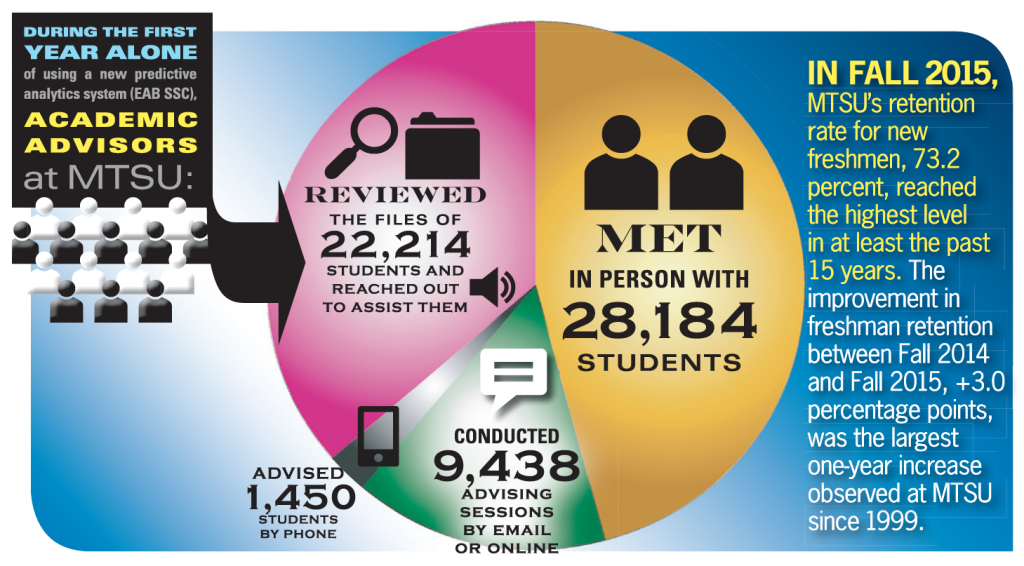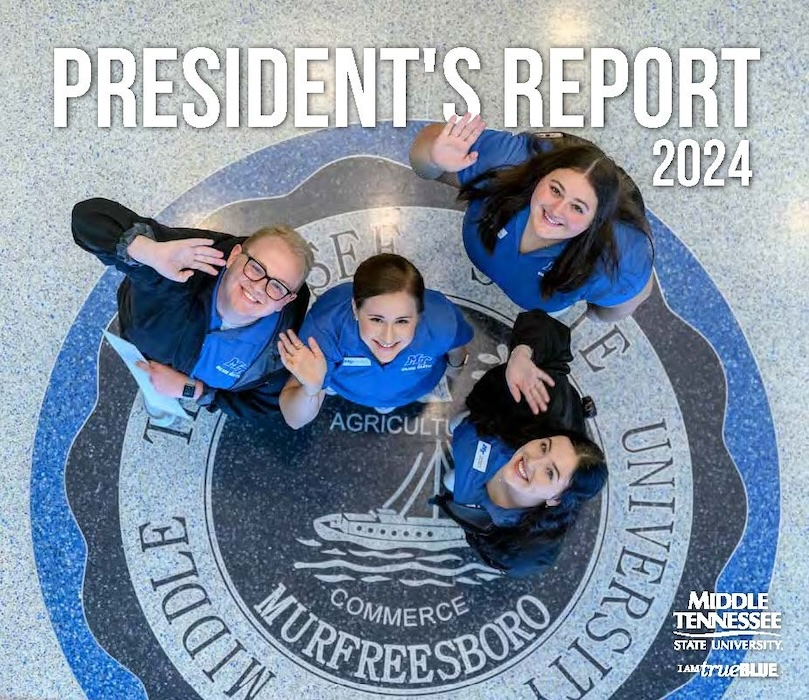Furthering the Quest
Filed Under: President's Post, Featured Articles
Our ultimate success as educators here at MTSU, I believe, lies in our day-by-day efforts to ensure that every student gets the attention they deserve on their path to earning a degree.
Our unwavering focus on helping individual students overcome obstacles, stay enrolled in classes, and earn college degrees, regardless of the external factors around us, is what I believe will make us a successful institution today, tomorrow, and in the future.

A few years ago, MTSU launched a major initiative—the Quest for Student Success. This Quest is designed to ensure that every student who comes to MTSU with the drive to achieve will be met with the best instruction from excellent professors who care for their success. As part of the Quest, University faculty and staff members have also become more flexible and nimble enough to provide extra support and assistance when our students encounter unexpected difficulties or when roadblocks arise that negatively affect their persistence toward graduation. By doing so, we have created a culture of high expectations coupled with personal attention when students struggle inside or outside the classroom. The following update provides a list of the top 15 recent developments in our Quest. True Blue!
1 On January 15, 2016, more than 100 students were welcomed to the REBOUND program. In its second year of operation, REBOUND provides specialized advising and programming to freshmen who earn less than a 2.0 GPA in their first semester of studies. The one-year retention rate for students who participate in REBOUND is 50 percent higher than for students who do not.
2 The Scholars Academy continues its tradition of success in serving at-risk new freshmen. In Fall 2014, 113 students entered the program. By Fall 2015, a total of 85 percent of these Scholars Academy students returned to MTSU, a retention rate that easily surpassed new freshmen who were not a part of the program (73.2 percent). In Fall 2015, the Scholars Academy expanded to serve 167 students. Early indicators show that these students, much like those who participated in earlier programs, continue to excel. About one-quarter were named to the Dean’s List, and nearly 50 percent earned above a 3.0 GPA in their first semester of studies.
3 MTSU’s tutoring initiative continues to evolve to support the academic needs of students. Although the Office of Student Success coordinates tutoring, the real work involved is accomplished by faculty and chairs who recruit, hire, and manage tutors for their individual program areas. In Fall 2015, free tutoring was offered for 187 courses, representing 24 disciplines. In this semester alone, students spent 7,089 hours in tutoring!
4 A transformative model of academic advising developed and implemented as part of the Quest has reshaped the student experience at MTSU. This initiative has involved:
- Selection and appointment of advisor managers for every college
- Recruitment and appointment of 47 additional advisors to bring the median student-to-advisor caseload to 300/1 or less
- Creation of work spaces for college advising centers
- Development of a year-long education and training program to prepare and acclimate advisors to a new student success paradigm
- Creation and implementation of an advising culture that is student-centered, data-informed, and strategy-driven
- Met in person with 28,184 students
- Conducted 9,438 advising sessions by email or online
- Advised 1,450 students by phone
- Reviewed the files of 22,214 students and reached out to assist them
- Altogether, made 63,945 contacts with students
- MTSU was recognized as a top user among the more than 170 universities using the EAB SSC system.
- Advisors focused on basic outreach campaigns—like getting students enrolled for the upcoming semester—that produced significant gains in persistence rates from the Fall 2014 to Spring 2015 semester.
- Persistence rates increased by 2.2 percentage points for new freshmen, 4.5 points for transfers, and 2.1 points for sophomores.
- It is estimated that improvements in persistence rates for the first semester alone resulted in the generation of an additional $1.5 million in Spring 2015 tuition and fees.
- It is estimated that these efforts resulted in retaining an additional 390 students from Fall 2014 to Spring 2015.
- Willingness to discuss problems
- Responds in a timely manner
- Is approachable and easy to talk with
- Is available when assistance is needed
- Is helpful in clarifying life and career goals
- Is helpful in obtaining tutorial assistance
- Is helpful in improving study habits
- Is helpful in selecting a major
9 Over the past three years, a total of 28 MTSU gateway, high-enrolled undergraduate courses have been redesigned. All 10 of MTSU’s most predictive and most enrolled courses have been redesigned. The redesign of courses, in every case, has led to increases in rates of success for students.
10 In Fall 2015, MTSU’s retention rate for new freshmen, 73.2 percent, reached the highest level in at least the past 15 years. The improvement in freshman retention between Fall 2014 and Fall 2015, +3.0 percentage points, was the largest one-year increase observed at MTSU in at least the past 15 years.
11 Although Spring 2016 census data will not be available until later in the semester, trends show that persistence (the percentage of students who started in Fall 2015 and return in Spring 2016) continues to increase—in every category! Although Spring 2015 was a record year for student persistence, trends suggest continued persistence increases across all student categories for Spring 2016.
12 Raider Learning Communities (RLCs) were re-invigorated for the Fall 2015 semester, with 28 paired courses offered to serve students. Pairings of courses were predicated on the analysis of course offerings data from previous semesters. Faculty members were encouraged to consider participating in an RLC. Professional development support including readings and a retreat were provided to RLC faculty. Analysis of student experiences and performance outcomes is underway.
13 In the past six months MTSU has participated in limited-invitation convenings to discuss the future of higher education and student success initiatives, including:
- In December 2015 in Indianapolis at the invitation of the Lumina Foundation
- In October 2015 in Indianapolis as a panelist at EDUCAUSE, sponsored by the Bill and Melinda Gates Foundation
- In September 2015 in Seattle at the invitation of the Bill and Melinda Gates Foundation
- MTSU was featured in the March 13, 2015 edition of the Chronicle of Higher Education, and MTSU’s efforts were pointed out in the Washington Post on June 14, 2015.
- In August 2015, MTSU was identified as one of five finalists nationwide for the prestigious and highly competitive 2015 Project Degree Completion Award from the Association of Public and Land Grant Universities (APLU). The award recognizes high-performing institutions for exemplary student success initiatives to improve retention and degree completion.
- In September 2015, EDUCAUSE announced 24 recipients of iPASS (Integrated Planning and Advising for Student Success) grants. MTSU was selected to receive $225,000 over the next three years to fund a portion of the SSC Campus and DegreeWorks initiatives. Institutions had to be invited in order to make application for the highly competitive grants. And, of course, competition was stringent among those who submitted proposals. With funding provided by the Bill and Melinda Gates Foundation, iPASS grants are intended to promote and enhance the ability of leading institutions to graduate more students.
- In October 2015, MTSU was presented with the Data Driven Impact Award by the Education Advisory Board, a consulting group specializing in student success. MTSU was one of three universities to receive an award. In MTSU’s case, the award was in recognition of the University’s use of data to inform decisions that improve the success of students.



